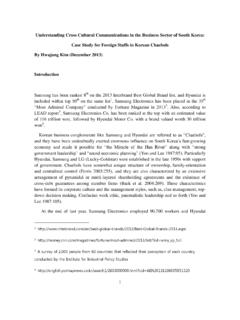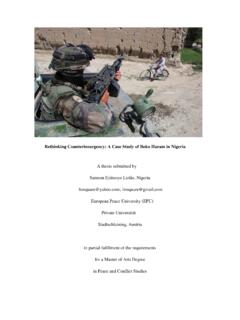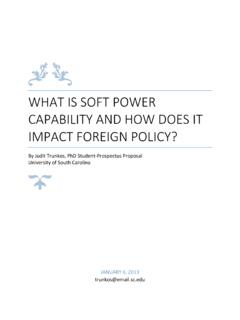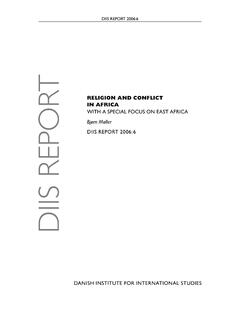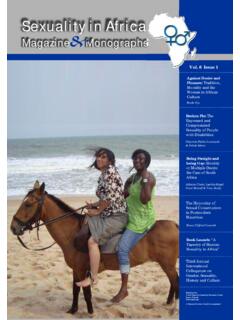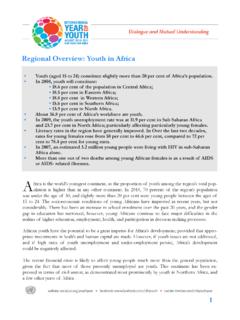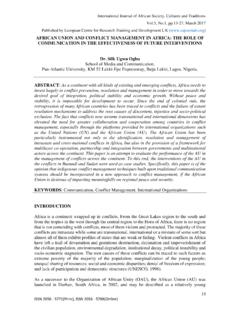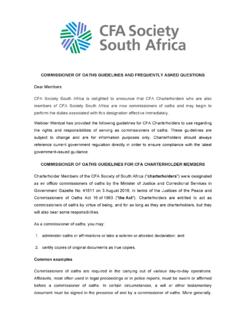Transcription of Major challenges facing Africa in the 21st century: A few ...
1 Major challenges facing Africa in the 21st century: A few provocative remarks Ibrahim Farah, Sylvia Kiamba and Kesegofetse Mazongo1. At the International Symposium on Cultural Diplomacy in Africa - Strategies to confront the challenges of the 21st Century: Does Africa have what is required? Berlin, 14th 17th July, 2011. Introduction Western civilisation and culture began to creep into Africa when foreigners,'-- mainly Europeans -- quest were aimed at imposing imperial ideologies and pilfering African resources. Since then, African scholars argued that this practice continued even after independence in the continent.
2 A number of challenges face the continent in the 21st century. These include colonial legacy; foreign aid; foreign direct investment (FDI); the climate change debate, Africa and the challenge of the MDGs; and cultural diplomacy as a new tool. This paper attempts to make a few provocative remarks on some of the key debates forming these issues. The paper argues that whether the continent is up on its tasks or not, there is lack of visionary leadership on the African side while Europe has been honest about its interests more than a mutually-agreed partnership with the continent.
3 Colonial legacy Colonization distorted and retarded the pace and tempo of cultural growth and the trend of civilisation in Africa . The consequences of colonization have resulted in political of the colonies which led to an unbridgeable cultural gap between the beneficiary nations and 1. Dr. Ibrahim Farah is a Nairobi-based academic whose areas of interest include foreign policy analysis, conflict studies and environmental diplomacy while Ms. Sylvia Kiamba and Mr. Kesegofetse Mazongo are postgraduate students at the University of Nairobi.
4 1. victims of the practice. The era of colonization pillage and plunder led to the relative stagnation and often decline of traditional cultural pursuits in the colonies. Mimiko asserts that: The social fabric was completely devastated and a new culture of violence was implanted. Traditional African systems of conflict resolution were destroyed and, in their places, nothing was given. The democratic process, rudimentary though it was, but with great potential as accompanies every human institution, was brutally uprooted and replaced by the authoritarianism of colonialism.
5 A new crop of elites was created, nurtured, and weaned on the altar of violence and colonialism armed with the structures of the modern state to continue to carry out the art and act of subjugation of the mass of the people in the service of The above assertion was supported by Kasongo who argues one could infer that while westernization was imported to African countries, the hidden side of modernism was materialistic To Kazonog, civilization was just another concept of domination, imposition of incoming new culture over traditional Standage, on the other hand, posits that the historical context of westernization in Africa with Europe was through the Atlantic slave trade, missionary and imperialism.
6 The forced acceleration of the black populations into the new world represented the sustained assimilation of western culture by Not that was all bad, however. Arowolo states that the colonial factor was essential in the understanding of the process of westernization in Africa . As a result, the effectiveness of colonization in changing the sphere of life in African societies is not hard to Its political effects include western civilization being submerged and with the dismantling of indigenous institutions and cultures by instilling foreign rule.
7 There was also the introduction of liberal democracy that did not necessarily work in Africa , not because Africa did not have its own pattern of democracy before the imposition of liberal democracy, but the typical democracy in Africa and its processes were also submerged by 2. Mimiko insisted on the same argument by stating that: But the point is that the so-called Kabiyesi syndrome, which has been accorded as an explanation for the shortage of democracy in contemporary Africa is actually a betrayal of inadequate understanding of the workings of the African traditional political systems.
8 I strongly dispute this proposition as unhistorical and therefore invalid in the context of Africa . Our hypothesis is that in the epoch before contact between Europe and Africa , the latter not only developed relatively advanced state structures, but that emergent pre-colonial African states also had sophisticated systems of political rule with strong democratic foundations. I argue that the basis of the advertised inability of these societies to sustain democracy in contemporary (postcolonial) times could not have consisted in the absence of a democratic culture on their part.
9 Rather, it is the residue of constraints that were attendant upon imperialism, which has been the dominant experience of the African peoples since the fourteenth century defined most profoundly by slavery, colonialism, neo- colonialism, and their handmaiden, military Economic effects of colonialism The economic effects of colonialism can be viewed as a progressive integration of Africa into the world capitalist system within which Africa functioned primarily as a source of raw materials for western industrial production.
10 The colonial economy also caused agriculture to be diverted towards the production of primary products and cash crops, a situation that contributed to hunger and starvation in Africa . Africa concentrated on producing more of what was needed less and produced less of what was needed most. Africa was perpetually turned to the production of raw materials, a situation that caused unequal exchange in -- and balance of -- trade. Rodney suggests that the plunderage and systemically corrupt enterprises established in the colonies to expropriate natural resources in Africa to Europe have facilitated under- development of Africa while it engendered the development of Alkali argues that colonization demanded a total re-organization of the African economy.

